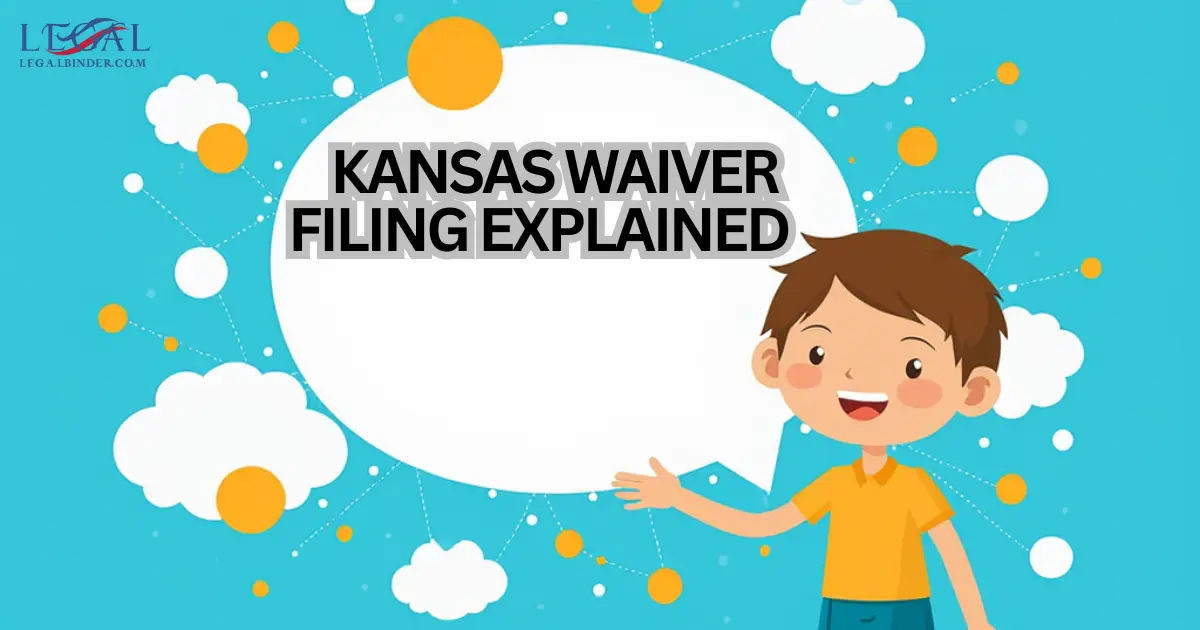Kansas waiver filing helps residents request relief from court or administrative fees when financial hardship makes payment difficult. This 2025 guide outlines eligibility requirements, step-by-step filing instructions, required documentation, and official Kansas resources to ensure your waiver submission is complete and accurate.
Quick Overview — What This Kansas Waiver Filing Covers
In Kansas, waivers allow petitioners to proceed without paying fees associated with filing civil, family, or appellate cases. Common uses include:
- In Forma Pauperis motions to waive court filing fees.
- Fee waivers for appellate transcripts.
- Administrative fee relief in state agencies when authorized by law.
State-Specific Requirements Kansas Waiver Filing
Kansas courts evaluate waiver requests under the Kansas Rules of Civil Procedure and state statutes. Eligibility depends on income, assets, and household obligations.
- Applicants must be Kansas residents and provide proof of residency.
- Courts consider income, savings, and public benefit receipt (such as Medicaid or SNAP).
- Applicants must submit a complete, sworn affidavit describing their financial status.
Key agencies and resources:
Step-by-Step: How to Complete & Submit Kansas Waiver Filing
- Download the proper form: Use the In Forma Pauperis or waiver affidavit form from Kansas Judicial Branch.
- Gather documentation: Pay stubs, public benefits letters, bank statements, rent/mortgage and utility bills, and identification.
- Complete the affidavit: List all household members, income, assets, and monthly expenses accurately. Discrepancies can result in denial.
- Sign and notarize: Many Kansas courts require notarized affidavits. Check with your local clerk.
- Attach supporting evidence: Include benefit verification, pay stubs, and bills to substantiate claims.
- Submit to the appropriate clerk: File with the district, circuit, or appellate clerk depending on your case type. Retain a stamped copy for your records.
- Monitor progress: Respond to any requests from the clerk or judge and attend scheduled hearings.
- In Forma Pauperis / Affidavit of Indigency form (Kansas Judicial Branch)
- Proof of benefits (Medicaid, SNAP, or TANF)
- Recent pay stubs or employer verification
- Bank statements showing available funds
- Copies of essential bills (rent, utilities, medical)
- Case-specific documents (complaint, appeal notices)
Processing Time, Fees, and Deadlines
- Processing time: Typically a few days to a few weeks depending on court workload.
- Fees: Filing a waiver is generally free. If denied, fees must be paid to proceed.
- Deadlines: Submit the waiver when filing your initial case or prior to appeal deadlines.
Common Mistakes to Avoid
- Using outdated forms — always verify via Kansas Judicial Branch.
- Failing to attach required supporting documents.
- Inconsistent information or leaving required fields blank.
- Filing at the wrong court or with incorrect case numbers.
- Not keeping a stamped copy of the submission.
FAQs
Q: Who qualifies for a waiver in Kansas?
A: Individuals with low income, minimal assets, or receipt of public benefits may qualify, subject to court review.
Q: Does receiving Medicaid guarantee approval?
A: No. It is strong evidence, but the court reviews the full financial affidavit before granting a waiver.
Q: Can prisoners file for fee waivers?
A: Yes. Inmates can request in forma pauperis status for civil or appellate matters.
Q: What if my waiver is denied?
A: You must pay the required fees to proceed or risk case dismissal.
A: Kansas Legal Services, local court self-help desks, and university law clinics provide guidance.
Conclusion & Call to Action
Filing a waiver in Kansas requires using the correct affidavit, providing accurate financial documentation, and submitting to the proper court clerk. Following these steps improves approval chances.
For official forms and instructions, visit the Kansas Judicial Branch and verify benefits through the Kansas Department of Health and Environment. Consult Kansas Legal Services or a licensed attorney for case-specific advice to ensure compliance with all Kansas waiver requirements! For more article Click Here
